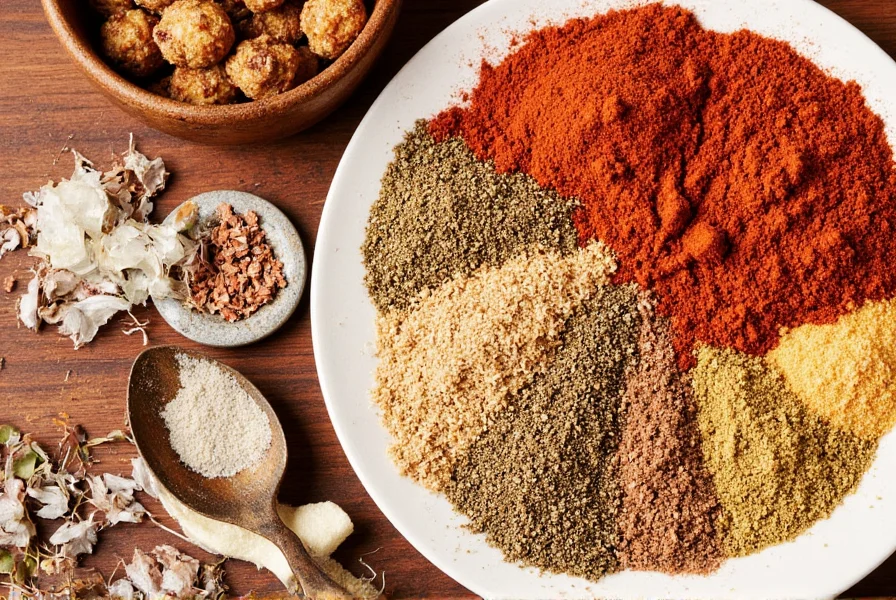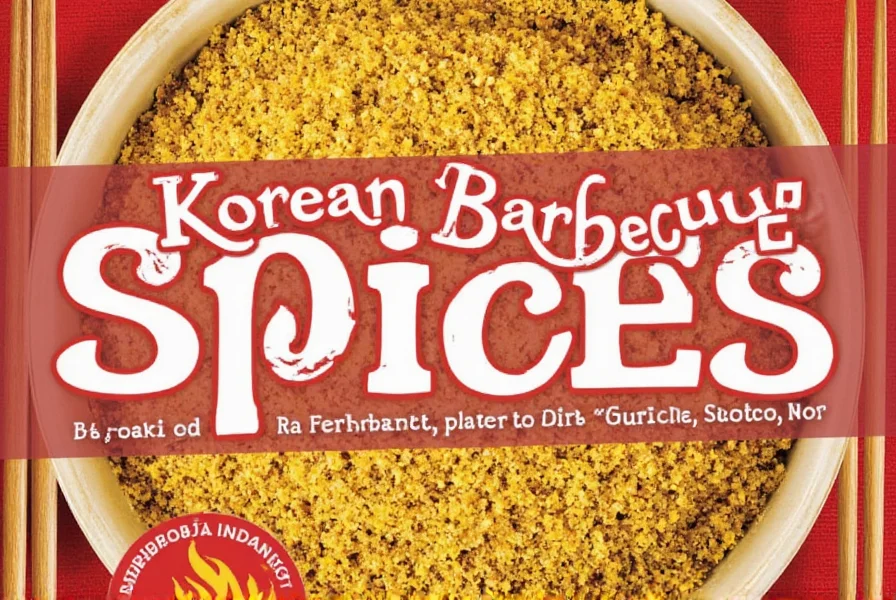Korean Barbecue Spices: A Sizzling Guide to Flavor, Culture, and Fire!
Have you ever stood by a sizzling Korean barbecue table, mesmerized by the smell of marinated meat dancing in the air? That irresistible aroma is no accident — it’s the magic of Korean barbecue spices.
Table of Contents
- What Makes Korean Barbecue Unique?
- Key Ingredients in Korean BBQ Spices
- How to Make the Perfect Marinade
- Dry Rub vs. Wet Marinade: Which Should You Use?
- Pro Tips for Using Korean BBQ Spices at Home
- How Korean BBQ Spices Fit into Global Spice Traditions
- Buying Guide: Top Korean BBQ Spice Blends & Kits
- Final Thoughts on Korean BBQ Magic
What Makes Korean Barbecue Unique?
Unlike Western-style barbecues where meats are often grilled plain and then slathered in sauce after cooking, Korean barbecue (KBBQ) brings the flavor before the flame. The marinades and spice blends infuse every bite with a balance of sweet, salty, spicy, and savory notes that reflect centuries of culinary evolution across Korea.
Key Ingredients in Korean BBQ Spices
Whether you're preparing galbi (marinated beef ribs), bulgogi (thinly sliced beef), or dakgalbi (spicy stir-fried chicken), the foundation of any good Korean barbecue dish lies in its seasoning. Here’s a breakdown of common components:
| Ingredient | Description | Flavor Contribution |
|---|---|---|
| Gochujang (Korean chili paste) | Fermented soybean, rice, and red pepper paste | Deep umami heat |
| Soy Sauce | Brewed salted soy sauce | Saltiness, backbone of marinade |
| Sesame Oil | Toasted sesame oil | Nutty richness |
| Mirin or Rice Wine | Sweet rice wine | Tenderizes meat, adds sweetness |
| Ginger & Garlic | Fresh grated or minced | Spicy warmth and pungency |
| Sugar or Honey | Natural sweeteners | Balances salt and spice |
Digging Deeper: Fermentation & Flavor
Korean cuisine relies heavily on fermentation, and gochujang is a prime example. This fermented chili paste isn't just about heat — it delivers layers of flavor through natural aging processes, much like miso or aged cheeses. When incorporated into marinades, it builds complexity and depth over time.
How to Make the Perfect Marinade
The secret to tender, flavorful Korean barbecue is all in the marinade. Here's a basic yet powerful recipe that works for beef, pork, or chicken:
- 4 tbsp soy sauce
- 2 tbsp gochujang
- 1 tbsp mirin or rice wine
- 1 tbsp brown sugar or honey
- 1 tsp sesame oil
- 1 clove garlic, minced
- 1 tsp grated ginger
Mix all ingredients together and coat your thinly sliced meat. Let it sit for at least 1–2 hours in the fridge, but overnight marination yields the best results. The acid from the rice wine and enzymes from the ginger help break down muscle fibers, resulting in tender, juicy bites.
Dry Rub vs. Wet Marinade: Which Should You Use?
While most traditional KBBQ recipes call for wet marinades, dry rubs can offer a unique twist, especially when grilling thicker cuts or using gas grills instead of tabletop setups.
| Method | Ingredients Used | Best For | Cooking Time |
|---|---|---|---|
| Wet Marinade | Liquid-based, includes soy sauce, gochujang, etc. | Thinly sliced meats | Several hours to overnight |
| Dry Rub | Powdered spices like gochugaru, garlic powder, onion powder | Thicker cuts or quick prep | 30 mins minimum |
When to Choose Each Method
- Use wet marinades when you want deep flavor penetration and tenderness, especially for beef or chicken.
- Opt for dry rubs if you're short on time or grilling fatty cuts like pork belly, which benefit from crusty char formation.
Pro Tips for Using Korean BBQ Spices at Home
- Don’t skip the resting period. Marinating overnight ensures better flavor and texture.
- Control the fire. Too high heat will burn the sugars in the marinade before the meat cooks properly.
- Add aromatics while grilling. Garlic slices or scallions placed around the edges of the grill add subtle fragrance and visual appeal.
- Balance is key. If your mix feels too salty or too spicy, adjust with a splash of vinegar or lime juice.
- Grill in small batches. Overcrowding lowers the temperature and leads to steamed, not seared, meat.
How Korean BBQ Spices Fit into Global Spice Traditions
Korean barbecue spices may seem niche, but they hold their own in the global spice arena. Like Japanese shichimi togarashi, Indian garam masala, or Mexican adobo, Korean blends combine heat, umami, and aromatic elements to enhance both meat and vegetables.
In contrast to American barbecue sauces that lean sweet and tangy, or Middle Eastern spice mixes like za'atar that emphasize herbal freshness, Korean flavors embrace fermentation and bold contrasts. Think of it as the fiery cousin who shows up with a smile and a punch — you might wince at first, but you’ll miss them when they’re gone.
Buying Guide: Top Korean BBQ Spice Blends & Kits
If you’re not into DIY, there are excellent pre-made options out there. Below are our top picks based on flavor profile, versatility, and convenience.
| Product Name | Features | Pros | Cons | Best For |
|---|---|---|---|---|
| Hansik Korean BBQ Seasoning Pack | Includes gochugaru, garlic powder, sesame oil packets | Easy-to-use, authentic blend | Pricier than generic brands | Beginners and foodies |
| Maangchi Signature Bulgogi Kit | Pre-mixed marinade base with instructions | Trusted name, great taste | Not customizable | Busy cooks, home chefs |
| Samyang Korean BBQ Dry Rub Mix | Spicy, gochugaru-forward blend | Fast prep, intense flavor | Too hot for mild palates | Meat lovers, spice fans |
| Ottogi Bulgogi Marinade Base | Ready-to-use paste | No prep required | May lack depth compared to homemade | Weeknight meals |

Choosing the Right Product
- For Authenticity: Look for products made in Korea or recommended by Korean chefs.
- For Convenience: Ready-to-use pastes or marinades save time without sacrificing too much flavor.
- For Customization: Choose individual spice kits so you can tweak the ratios to suit your taste.
Final Thoughts on Korean BBQ Magic
Whether you're hosting friends for a DIY KBBQ night or spicing up your weeknight meal rotation, Korean barbecue spices offer a passport to flavor. With the right balance of salt, sweetness, heat, and umami, these seasonings can transform even the humblest cut of meat into something extraordinary.

So go ahead — light up the grill, grab your favorite spices, and let the sizzle tell the story. After all, Korean barbecue isn't just about eating — it's about experiencing joy, culture, and community through fire and flavor.










 浙公网安备
33010002000092号
浙公网安备
33010002000092号 浙B2-20120091-4
浙B2-20120091-4